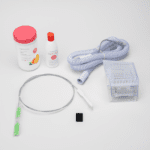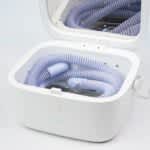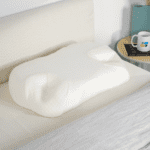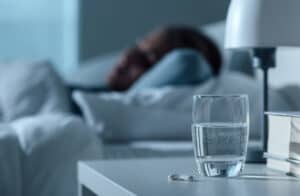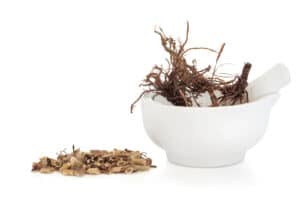Probiotics are live bacteria that can be found in dietary supplements and certain foods. Research about probiotics is growing, and there’s some evidence that these “good bacteria” may promote general health and may even support better sleep.
The bacteria in probiotics are similar to some of the bacteria that occur naturally in your body. While more and more Americans are taking probiotic supplements, it’s important to recognize that there is still a great deal that is unknown about the possible benefits and drawbacks of probiotics.
We’ll help you understand the research behind probiotics and sleep, which probiotics scientists have studied, and offer proven tips that can help you get a better night’s rest.
Can Probiotics Help With Sleep?
A few preliminary studies suggest that taking probiotics may improve overall sleep quality and reduce daytime fatigue, but more research is needed before health experts can recommend probiotics to help with sleep.
Many people associate bacteria with unwanted germs or infectious disease. However, the human body contains trillions of naturally occurring microbes that are vital to overall health.
The various microbes in the body are known collectively as the microbiome, and different microbiomes can develop in different parts of the body, such as in the gut and the mouth.
Probiotics are the beneficial bacteria in the microbiome that are important for a wide range of processes in the body. Researchers believe the makeup of the microbiome may play a crucial role in regulating:
- The immune system
- Digestion and nutrition
- Dental health
- Mental health
There may also be a relationship between the microbiome and sleep. Both sleep and the microbiome are influenced by circadian rhythm, which is the brain and body’s internal 24-hour clock. The bacteria that populate the digestive system, called the gut microbiome, may even directly impact sleep by regulating important sleep-promoting hormones like melatonin.
Some research suggests that the gut microbiome and sleep quantity may have a bidirectional relationship. In other words, a person’s gut bacteria may influence how much they sleep, while sleep loss can lead to changes in the makeup of the gut microbiome.
Researchers are still working to better understand the complex links between circadian rhythm, sleep, and the body’s good bacteria, so for now, consuming probiotics can’t be thought of as a treatment for sleeping problems.
Scientists are conducting studies to identify ways to enhance the microbiome and treat health conditions, including sleep problems.
One way to improve the microbiome is through probiotic supplements. There’s promising preliminary research that suggests certain probiotics may have a positive impact on sleep. For example, certain probiotics may:
- Improve overall sleep quality
- Decrease the time it takes to fall asleep
- Reduce awakenings during the most restorative stage of sleep
There’s a great deal of scientific interest and ongoing research looking at the relationship between probiotics and sleep. However, taking probiotics has not yet been proven to improve sleep problems or overall sleep health.
In general, it’s a good idea to talk with your doctor before taking any probiotic supplements or making any significant changes to your diet.
Having Trouble Sleeping?
Supplements like probiotics can help, but it’s important to address underlying issues like sleep apnea. Answer these questions to see if you’re at risk.
Which Probiotics Can Improve Sleep?
Initial research shows certain probiotic strains, including various types of Lactobacillus and Bifidobacterium, have a positive impact on sleep. However, there’s still not enough evidence to support using probiotics to improve sleep.
Probiotic bacteria occur naturally in the body, but certain bacteria can also be introduced to the digestive system by eating foods that contain these good bacteria or by taking probiotic supplements. Probiotic supplements may come in a variety of forms, including pills, powders, or liquid drops.
Probiotic supplements contain live bacteria and sometimes other microorganisms like yeast. The microorganisms in probiotic supplements are usually similar to those found inside the body.
You may also see supplements labeled as prebiotics or synbiotics. Prebiotics contain special types of carbohydrates that provide fuel for probiotic bacteria to grow, and synbiotics are supplements that contain both probiotics and prebiotics.
Keep in mind that not all probiotic supplements are the same. Different supplements contain different types of bacteria that may have unique health effects. Researchers have looked at several probiotics and probiotic combinations in relation to sleep.
- Lactobacillus plantarum: There’s some evidence that Lactobacillus plantarum can increase daytime energy levels and boost sleep quality during deep sleep.
- Lactobacillus gasseri: Multiple small studies have investigated Lactobacillus gasseri and found a positive effect on overall sleep quality.
- Bifidobacterium longum: One study found a link between Bifidobacterium longum probiotic supplements and improved sleep.
- Probiotic combinations: Supplements may also use a combination of more than one type of bacteria. For example, some research shows that combining multiple strains of Lactobacillus and Bifidobacterium bacteria may improve sleep quality and help people fall asleep faster.
While the research to date is promising, experts don’t recommend taking probiotics for sleep. More work is needed before scientists fully understand the impact of different probiotics on sleep as well as the potential risks and side effects.
The FDA has not approved any probiotics as medications to treat sleep disorders. Instead, probiotics are sold as dietary supplements and are not required to meet the same safety and quality standards as prescription drugs.
It can be helpful to research probiotics of interest before purchasing them, including any health claims made by the manufacturer. A health care professional may also be able to offer guidance on any probiotics you are considering.
How Probiotics Help With Overall Health
The microbiome plays an important role in various functions of the body, which is why probiotics may have the potential to promote general health. However, much remains unknown about how taking probiotics can directly impact your overall wellness.
Probiotics and Digestive Health
Your digestive system is home to the body’s largest community of bacteria and other microorganisms. Known as the gut microbiome, this collection of microbes helps keep you healthy by:
- Aiding digestion
- Strengthening the immune system
- Clearing toxins
Probiotics can help change the gut microbiome. More research is needed, but this effect may be useful for treating digestive issues such as:
- Diarrhea, especially after having taken antibiotic medications
- Long-lasting constipation
- Irritable bowel syndrome
While some research results have been encouraging, additional studies will be required to clearly establish the role of probiotics in supporting digestive health. If you have stomach problems or a digestive disease, you should consult with a doctor before using probiotics.
Probiotics and Allergies
The microbiome is an important component of the immune system and may play a role in how allergies develop. Your immune system helps protect you from harmful germs, but allergies can arise when the immune system overreacts to an environmental trigger.
Allergies can lead to unwanted symptoms such as sneezing, congestion, rashes, itchiness, and difficulty breathing.
An unhealthy gut microbiome may be involved in the emergence of allergies early in life. Some studies also show that certain probiotics may be helpful for treating eczema, a skin condition that causes itchy rashes and is associated with allergies.
Probiotics are unproven as a treatment for allergies, though, so it is best to consult with an allergist about the best ways to manage allergies and whether there may be any benefits from taking probiotics.
Probiotics and Dental Health
In addition to the gut microbiome, there’s also a dynamic community of microbes that live in your mouth. This oral microbiome coats the inside of your mouth, and if it contains too many bad bacteria, it may affect dental health.
Certain changes in the oral microbiome are associated with dental problems including cavities and advanced gum disease, which is an inflammation in the gums that can lead to tooth loss.
Researchers have found some indications that supplementing the oral microbiome with probiotics may help prevent cavities in infants. Certain probiotics may also help prevent gum disease, which affects more than two-thirds of older adults.
These study results are preliminary, though, so you should always ask a dentist before trying to alter your oral microbiome with probiotics.
Probiotics, the Brain, and Mental Health
Researchers have started to uncover a relationship between the gut microbiome and the brain. The brain, the gut, and the gut’s microbes interact by sending different kinds of signals between each other.
In fact, things like your mood and stress level may be influenced by the bacteria in your digestive system. Changes in the gut microbiome may also be linked to a range of mental health and neurological conditions including:
- Anxiety
- Autism
- Parkinson’s disease
- Alzheimer’s disease
Research is still in its early days, but scientists are hard at work to find out whether probiotic treatments can improve mental health. Recent findings offer promising indications that certain probiotics may be useful for reducing the symptoms of stress and anxiety.
Because probiotics are not yet proven as a treatment for mental health issues or neurologic conditions, you should make sure to talk with a doctor or mental health professional first if you are considering using probiotic supplements.
Other Ways to Promote Sleep
In the future, probiotics may become an accepted tool to improve sleep, but for now, most experts don’t recommend taking probiotics for sleep. Instead, there are many proven strategies that improve sleep that you can start using today.
Known as sleep hygiene, these healthy sleep practices can help you get the quality and quantity of sleep you need each night.
- Be active during the day: Getting regular exercise throughout the week is good for your health and can also improve your sleep. If you’re not sure where to start, try going for a short walk and slowly building up to 30 minutes per day.
- Get some sunshine: Exposure to sunlight, especially in the morning, can help tune your circadian rhythm and make it easier for you to keep a regular sleep schedule. If possible, aim for at least 30 minutes of natural light exposure every day.
- Cut back on caffeine: Caffeine is a stimulant that can interfere with your body’s normal process of promoting sleep. Try to limit your caffeine consumption to the morning or early afternoon while also avoiding other stimulants like nicotine later in the day.
- Reduce evening alcohol intake: A few drinks at night may make you sleepy, but alcohol can disrupt your ability to get deep, restorative sleep.
- Stick to a schedule: For both weekdays and weekends, try to maintain a regular schedule for waking up and going to bed.
- Create a relaxing bedtime routine: Having a calming nightly ritual can help put you in the right state of mind for sleep. This can include taking a bath, brushing your teeth, reading a book, or practicing meditation. Your routine can be unique to your interests, so don’t be afraid to experiment and find what works best.
- Optimize your bedroom for sleep: A few small adjustments to your bedroom environment can make it easier to sleep well. Try to keep your sleep space quiet, dark, and comfortably cool. Turn off or silence your electronics and do what you can to block out unwanted noise and light.
- Get comfortable: An uncomfortable bed can make it harder to get a good night’s sleep. If you’ve had the same setup for a long time, consider shopping for a new mattress and pillows that fit your sleep position and comfort preferences.
- Get up if you can’t sleep: If you’re struggling to fall asleep or find yourself wide awake in the middle of the night, try getting out of bed and doing a quiet and calming activity until you feel tired again. It’s important to associate your bed with sleep, so lying awake in bed for 20 minutes or more can actually be counterproductive.
References
Ask the Sleep Doctor
Have questions about sleep? Submit them here! We use your questions to help us decide topics for articles, videos, and newsletters. We try to answer as many questions as possible. You can also send us an email. Please note, we cannot provide specific medical advice, and always recommend you contact your doctor for any medical matters.









